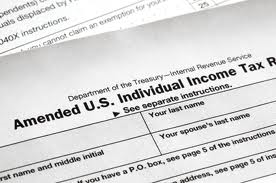Blog
Click here to go back
Posted in tax
 What should you do if you find that you made a mistake on your 2012 tax return after it's been filed? Perhaps you find that you missed a big deduction. Perhaps you receive a late notice of income you earned. Or perhaps you receive a corrected Form 1099 from your broker. The answer is not to panic. You can correct the mistake with an amended return.
What should you do if you find that you made a mistake on your 2012 tax return after it's been filed? Perhaps you find that you missed a big deduction. Perhaps you receive a late notice of income you earned. Or perhaps you receive a corrected Form 1099 from your broker. The answer is not to panic. You can correct the mistake with an amended return.
The general rule is that you have three years to amend a personal or business return. Special rules may apply if you paid your taxes late, or are claiming certain business losses or carrybacks. You may have as long as seven years if you are filing to claim a loss on a worthless security or bad debt.
Many amended returns are filed each year. Form 1040X is used to show the items of income or deductions that you want to change or the different elections you want to make. A separate form must be filed for each previous year you want to change. You?ll have to file a paper copy to amend your return, even if you originally filed electronically or by telephone. If you want to change a corporate return, you file a Form 1120X, but the procedures are similar.
If you owe additional tax because of the change, you should send a check at the time you file your amended return. The IRS will let you know if you owe additional interest or penalties.
Please contact our office if you have questions about any return that's already been filed. We can let you know whether you need to file an amended return and help you with any of the necessary paperwork.
Last Updated by Tax on 2014-02-12 11:41:01 AM
